Transcript Of My Coaching Sessions
with
Martial Singher
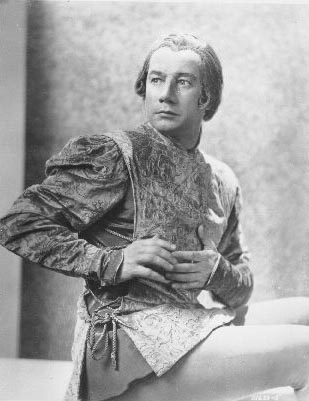
Photograph courtesy of Mme. Eta
Singher
The Role of Pelléas
July, 1984
Music Academy of the West
Santa Barbara, California
Donald Collup, baritone
Irving Beckman, piano
Act I
Act II
Act III
Martial Singer had not taught at the Music Academy for a few years,
but had been asked to return to direct an evening of French opera scenes.
Much to my disappointment, my name was not included amongst the cast lists of
scenes from Thais, Carmen, and Manon. I asked Mr. Beckman
that if we weren't cast in the opera scenes, would this mean that we would not be
able to work with M Singher. The answer was yes. Privately,
I then asked if it would be possible to work on the role of Pelléas with M.
Singher, especially concentrating on the vocal aspect. The sessions
were scheduled on two afternoons, in Lehmann Hall and the Main Auditorium.
A few words about the presentation of this transcript on my site: This is a
verbatim transcript that was written down from recordings of the sessions. I
have enlarged the print of the less-detailed comments of M. Singher so that
readers other than those that are interested in great detail of the role can get
a clear and quick summary of the sessions, hours that I will never
forget. I caution readers, though, to try not to read a particular emotion into
this printed text.
Act I
MS: Whatever your voice, you have to make a special idea of
the voice of Pelléas. It has to be an extremely forward voice, almost a
dental voice.
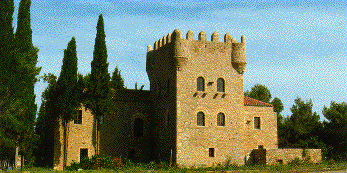 "...p. 35..."
"...p. 35..."
DC: Yes.
MS: Legato.
"...p. 35..."
But if anything, it should (not) be "Grand père,..". No, that's the
voice of...
DC: I'll never make it.
MS: That's the voice of Golaud.
DC: Yes.
"...p. 90..."
DC: Yes.
MS: That's the voice of Golaud.
DC: Yes.
MS: "Grand père,". Try to find that.
DC: High. high.
MS: No, no, no, that's the wrong idea.
DC: OK.
MS: The voice is never started high. The voice is always
started at the level of the g, even
singing the high notes. The voice is a vibration which start(s) here
(teeth) and goes up and
expands, but it's never started here (the top/back of the
head).
 DC: No, no.
DC: No, no.
MS: Now, for the mood, the first scene, which has been set, is that you have been
crying, OK? Your mother said that "11 a pleuré."
"...p. 35..."
Fine. You have a lovely voice and your french diction is
absolutely perfect. I would caution you to try to be lighter, try to be lighter.
Yes, yes. I don't know whether you
know that the tradition of Pelléas as a baritone is right. The first
Pelléas was a baritone, Jean Perier.
MS: Which...
DC: He sang Scarpia.
He sang Scarpia at the Opéra Comique. There's a
difference. The Opéra Comique did not require a ----- voice. But he was a
baritone, as I heard him in the later part of
his career when he was singing musicals and this kind of thing, but always was an
important voice. Nevertheless, he never sang the high notes.
 DC: That's a question.
DC: That's a question.
MS: No, he never sang the A's.
DC: Panzéra recorded the Tower Scene...
MS: Yes, Panzéra never sang...
DC: ...and sang F#'s instead of A's.
MS: Yes. He did the same.
DC: OK. Another question: Theodor Uppman...
MS: Yes...
DC: ...told me that it's "legal", as it were,...
IB: To do that?
DC: To do that. Now, ...
MS: I sang all the high notes.
DC: I know. I know, but...
MS: Well, I... I can tell you that the critic of The Post is
still Harriet Johnson.
DC: Yes.
She was already at the time and she wrote in the review of
my first Pelléas that as I had given an interview a few days before, I had
stated that I would sing all the high notes. So she said she had come with the
score with a flashlight and she checked and I had sung all the high
notes.
Harriet Johnson came to a class here two years ago and I met her
and we laughed together.
IB: It's a true story? With a flashlight: "did he really sing an A natural?"
"...p. 35..."
So, so... try lighter. You see, it doesn't matter. In this
scene, you are not expressing a great passion. You are sad, uncertain. With
Pelléas, you must try to give a stress constantly on the uncertain. You
see, he's always going away and never does.
DC: Yes.
MS: He's,... he's very uncertain. If you give it this
sureness from the start, then there will not be enough contrast with
Golaud.
DC: That's right. I think that's one of the arguments why it
should be sung by a tenor because... to contrast with Golaud,
but...
 MS: Yes, yes. Believe it or not, there is... one of my
favorite tenor(s) in our time is Gedda. But I sang Golaud to Gedda and he was
not good. It should not be a tenor.
MS: Yes, yes. Believe it or not, there is... one of my
favorite tenor(s) in our time is Gedda. But I sang Golaud to Gedda and he was
not good. It should not be a tenor.
DC: It's more... the role is more low than high. There are more
low notes than high notes.
MS: Yes, but there are long pages which are very high. So
you must protect yourself against
spreading too much the low voice.

DC: Yes...
MS: ...on one hand; and, on... being too heavy when you come to the high voice on
the
other, we must try... try to find to see what I... "Grand..."... "Grand..."... I
am... I am no
judge for this... "Grand père, j¹ai re¸u en même temps que..."
"Grand père,..."
"...p. 35..."
I can do that also.
DC: You can't take that...
MS: "Grand père,..." And for that, don't try to make a big cavity here. When
later, when you will sing Golaud, you will do that, but not now for that.
"...p. 35..."
That's it. Sad. Very, very good. Very good.
IB: Good.
MS: (To IB) Who sang your Pelléas at Hamburg this year?
IB: We've had Russell Smythe, an English baritone. Not bad, but he had a lot
of trouble
with the high notes. It need/e a light baritone in spite of that, but it's
also... we've had others, not so good. We had an American, John Stewart too.
Oh, it g...
"...p. 43-45..."
MS: It's lovely. You have a lovely voice and the... the
legato is excellent. Be very careful that, in the respect of the orderments of
eighth note, triplets and sixteenths. That's the whole
declamation of Debussy; is based on this theory...
"...p. 44..."
It's lovely. You have a lovely voice and the... the legato
is excellent. Be very careful that in the respect of the orderments of eighth
note, triplets and sixteenths. That,s the whole declamation of Debussy, is based
on this theory...
"...p. 44..."
It should not be edgy, not because if you are precise; it
should not be edgy. It should be absolutely precise.
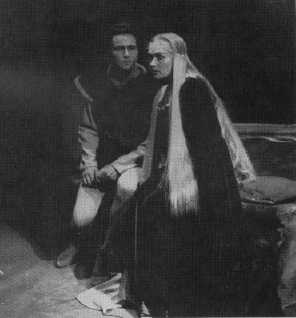
DC: Yes, yes. Dictation.
MS: Yes. May I... Can you... can you... is there any way to give a kind of
"open-air" feeling to this?
DC: I know.
"...p. 43..."
Slimmer. "Je venais..."
DC: Slimmer.
MS: Slimmer.
"...p. 43-44..."
DC: IYo, that's a triplet.
MS: Yes, yes. Not only that; you see, this is dreamy, "On s'embarquerait sans le
savoir et l on ne reviendrait plus." "It won't be so, but it could be." "That
could happen." And he's always wanting to go somewhere else...
DC: Yes...
MS: ...and not to come back, OK? But this is... dreamy.
"...p. 44-46..."
And also, if I could ask, it is small talk.
DC: Right. Yes.
MS: I would not give it too much of a vocal importance. You see, "Ilfaut que
ce..." "Il faut que ce soit un grand navire... Nous le vêrrons tout...
DC: Les lumières sont...
MS: "Les lumières sont très hautes, nous le verrons tout è l'heure
quand il entrera dans la bande de clarté."
DC: Yes...
MS: It's not very important. It's not important yet; whatever the symbolism we
could feel that there is in this; also, "well, shall we go forth for this trip
together?" Whatever; nevertheless:
not yet. It is... he doesn't know very much what to say to that girl for the time
being.
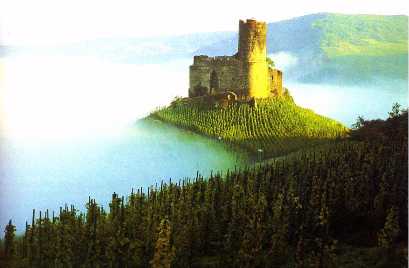 DC: Yes.
DC: Yes.
MS: So "Let's speak about the passing boat, and the condition of the sea,..."
OK?
DC: And the weather,...
MS: A little bit this way, huh?
IB: Small talk.
MS: But, there is something poetic in him. Whatever he
says, some poetry must emanate.
DC: Yes.
MS: See? So instead of making it so authoritative, make it a little bit like
that way maybe.
"...p. 45-46..."
"quand il entree..."
DC: "entree"?
MS: Not "rentrera".
DC: "nous... nous le verrons tout à l'heure..."
MS: "quand il entree..."
DC: "quand il... nous le verrons tout à l'heure quand il rentrera...,'
MS: "quand il entree..."
IB: Oh, you put an "r" in there.
 DC: Oh, you want me to...
DC: Oh, you want me to...
MS: No,...
DC: "quand..."
IB: There is no r.
MS: "quand il en..."
DC: Quand il en... Oh, I'm sorry... I see. "nous le verrons tout à l'heure
quand il entrera dans la bande de clarté."
IB: Right.
DC; Yes.
"...p. 46..."
MS:If you have... if you have the slightest trouble, do that nearer to o. "C'est
un phare;'
DC: Let me try... a little bit more slender.
"...p. 47-48..."
MS: Right, right. Now, here you see, again, it has been said that it is full of
symbolism. I
believe it or I don't. I have never made up my mind. But let's behave as if it
were, as if
there were symbolism. You see, now "on dirait' - he says "on dirait que la brume
s¹élève lentement..." and "Out; j'aper¸ois là-bas une petite
lumière que j'en avais pas vue..." Now
see, "C'est un phare;" "You are going to see more of those."
DC: It's a beacon, it's a signal. Yes.
IB: Uh huh, it has a meaning.
MS: And "on dirait que la brume s'élève lentement" Your voice must have
the of the
DC: Yes.
IB: ... of the water. Let's try that bar. Right at the top. Up
above.
"...p. 47..."
MS: Yes, but after this, I would almost say that hopefully.
DC: Excuse me?
IB: Hopefully.
MS: Hopefully. "il y en a d'autre que nous ne voyons pas encore." I forgot my
notes.
DC: That's all right.
 IB: It doesn't matter, it doesn't matter.
IB: It doesn't matter, it doesn't matter.
"...p. 47-51..."
MS: Where did you learn your french?
IB: Where did you find the notes? That's a very hard note to find. You don't
hear
anything.
MS: I don¹t remember...
IB: That alright.
MS: Where did you learn your french?
DC: From a lot of people. I think my first... I was in a boys choir...
MS: Yes...
DC: ...when I was a child and... the Texas Boys Choir...
MS: Yes...
DC: ...and we recorded Stravinsky's Persèphone...
MS: Oh...
DC: ...when I was, uh... 11 and I immediately was struck by Vera Zorina's diction
and
the french and the beauty of the french language and I think that was the
beginning...
and Wayne Conner taught me my french, you know, really well.
IB: You've sung a lot in french.
DC: I sing mostly in french. A lot of french song.
MS: Your french is perfection. It's impossible to tell that
you are not French.
 DC: Thank you.
DC: Thank you.
IB: Good, good. OK. We now have the next page...
MS: But see, what you have to add now, is: you use your
imagination. You have learned this to perfection. Your voice is eminently fitted
for it. Now you have to... somehow... flex a little bit everything in your mind
and try to find a motivation for each phrase...
DC: For every... yes...
MS: ...even if you go too far, even if it is not true, even
you... you add to the... to the symbolism, but you must find a different color
for each phrase,...
DC: Yes.
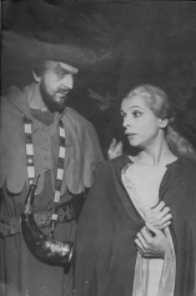 MS: ...with a motivation for it.
MS: ...with a motivation for it.
DC: Yes.
MS: So I believe that at the moment, your main work is of the mind, a mind which
is a little bit tainted of heart.
DC: A little bit...
MS: Tainted with... some heart.
"...p. 52..."
You see, don't accentuate the big notes that you make.
DC: OK.
MS: "On ne volt plus rien sur la mer..." You see?
DC: I totally see it. I, yeah... obviously.
"...p. 52..."
MS: Yes. See? Your personality is too authoritative. You
see, I do not believe at all that
Pelléas is this vague, faded character of . I hate that.
DC: No, he's... (arms open)
MS: Huh?
DC: It's...
MS: Exactly so, exactly so. In this way, the modern French tradition is totally
wrong.
DC: It's wispy, too...
MS: When we gave this here, and I told Maurice Abravanel:
"Now, Maurice, the fourth act of that is Tristan." "Tristan? You go a little
far." I said "No, let us try and get it together" and he said "Yes, it is like
Tristan."
DC: Sure. Of course.
 MS: See? I think, I think,... Pelléas, in the fourth
act, is... is almost a heldon baritone,...
MS: See? I think, I think,... Pelléas, in the fourth
act, is... is almost a heldon baritone,...
DC: Sure. Yeah.
MS: ...but not at the beginning.
DC: No.
MS: He will mature, with not only the passing of time,...
You see, she says in the... in the last act: "We have been here before but that
was very long ago..."
DC: Long time, yes...
MS: "Il y a de longs mois..." But even so, he has matured by
loving. He was immature only because he had not loved. At the moment, the love
overtakes him, and the love which is forbidden. Little by little, he matures;
also, in voice.
![]() DC: Yes, at the tower scene, it's automatically
higher.
DC: Yes, at the tower scene, it's automatically
higher.
MS: But at the beginning, keep it, I wouldn¹t say
impersonal, because I am requiring exactly
the contrary from you that you become very personal in feeling, but don't give it
too
much of a vocal authority. Delay. Even if you are to do it, don't give it all at
the start. Actually, the performance of Pelléas is very dangerous in that
the first two acts
have no climax whatsoever. You see, the discovery of Mélisande, the scene in
front of
the... the lecture of the letter, this scene here, the fountain, you see...
the... Golaud
sick,... there is a little bit of something there already that grows. And after
that, the
grotto - he doesn¹t get anywhere. All that is establishing itself. And the public
must have
an enormous patience which very often they don't have. And then starting with the
tower, then you can be yourself and give what you have.
 "...p. 52-53)..."
"...p. 52-53)..."
C'est le vent qui s'élève... qui s'élève.
DC: C'est le vent qui s'èlève?
MS: Oh, is it written s'élà...? Ah yes, I apologize. You were
right.
"...p. 53-54..."
"Je pars peut-être demain..." You have too much, you have too much
authority. You have too much authority. You see, you said "Je pars
peut-être demain...", which is excellent.
DC: For Verdi.
MS: "Je pars peut-être demain..." Who knows
"...p. 54..."
DC: I'm just worried that...
IB: ...that that won't come through the orchestra?
DC: Exactly. And carry in the house.
MS: Oh, there's nothing...
IB: Nothing much going on... you know... nothing much going on...
DC: OK, OK.
MS: I have a place in my score which I have marked: "CANNOT
BE HEARD". In one place, "CANNOT BE HEARD". Not at all. There,s lots of silence,
and you see, and it comes right after the scene,... of the...
 "...p. 54..."
"...p. 54..."
And you must have some of this character in the first scenes.
DC: Yes.
MS: You heard it it will be difficult to you see, your scene is a very
sweet scene.
DC: The letter?
MS: Yes, just before this.
DC: (p.) 35. Grand pêre, j'ai reçu...
MS: Just before, you see. p. 33. That's your music.
DC. Yes. Yes.
MS: From the beginning.
And so you must enter into this type of... But it must have
an intensity, and intensity of not large volume. And later, you can summon all
the volume you want.
DC: Light, light, light, light, light.
"...p. 5 6..."
Continue to Act II
Return to the only
opera
Go to Ope-ra
Go back to the HomePage